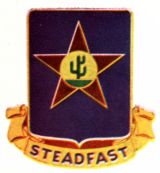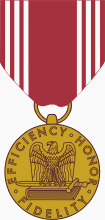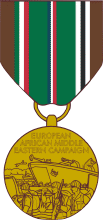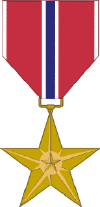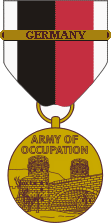- (Authored by Glen G. Clefisch)
In the fall of 1940, I entered college at South Dakota State College and was required to take
- ROTC (Reserve Officer Training Corp) for two years if physically fit. Shortly after beginning my
- second year, Dec. 7th, 1941, war was declared. At the end of the first two years of college, I was
- asked to enlist in the reserve - theoretically to allow me to remain in college until graduation. The
- third and fourth years in ROTC are considered advanced ROTC, which upon graduation and completion,
- I would be commissioned a 2nd Lt. in the infantry of the U.S. Army. However, after completing my 3rd
- year in college, the Army decided they needed bodies now, rather than later. I was called to active duty
- and sent to Camp Wolters, Texas. After basic training was finished, in September of 1943, I was shipped
- to Grinnel College in Iowa for a short time and then back to South Dakota State to await the call from
- the Infantry School at Ft. Benning, Georgia. This was the Officer Candidate School (OCS) for the infantry.
I graduated from their Infantry School on the 18th of April, 1944 and was assigned the 409th Infantry Regiment of the 103d Infantry Division. Upon reporting to Colonel Claudius Lloyd, the Regimental Commander, I was assigned to the Heavy Weapons, Company (only one to a battalion). Actually, I
- became the second platoon leader of D Company, which had four heavy water-cooled machine guns.
Col. Lloyd was an interesting individual - having served in WWI and was granted battlefield promotion
- to become an officer. He continued in service after the war and served as a Major when General
- MacArthur was a Lt. Colonel in the Philippines. He never became a general as he never attended
- West Point. That is not a requirement, but generally an unwritten rule. His officer serial number was O
- plus four digits. My serial number was O plus six digits. He must have been one of the first 10,000
- modern Army officers.
In the 103d Division, we received a large number of replacements that had been in the Army Specialized Training Program (ASTP). Again the Army decided they needed people more than furthering student education. This division had been nearly cleaned out of soldiers for use as replacements after the extreme losses on D-Day. Only non-commissioned officers and the higher ranking commissioned officers remained
- as cadre. We were in training that summer of '44 and received our call to go overseas in the fall. We
- traveled to Ft. Dix, New Jersey for embarkation. We were on a large troop ship (carried 18,000 troops) in a convoy taking fourteen days to get to Marseilles, France. I was hospitalized for appendicitis about two days out from Gibraltar, so I didn't get to see Gibraltar. I was operated on by Navy Personnel on board ship.
- Upon arriving in the port of Marseilles, I was moved by ambulance to a hospital in the city. I was released
- a few days later to rejoin my outfit. They were still in the staging area in preparation to go to 'The Front'. Shortly, we got our orders to go. We were assigned an area in the vicinity of Hagenau Forest and just
- outside Germany in the Stuttgart area. I managed to march into the reserve area but was near collapse. A battalion officer saw my condition and had me taken to HQ (Headquarters). Here I censored letters for all
- the men in HQ Company. Shortly I was transferred to regimental HQ as Regimental Liaison Officer. My
- duty was to carry certain messages, by jeep, to Division or to a neighboring outfit. While in this job, I spent
- a lot of time sitting on the floor - as the HQ area was small. While in the assignment, I had two unique things happen to me. The liaison officer from the 442nd Regimental Combat Team (RCT) was in our HQ. This was the Japanese-American (Nisei) regiment that had more than 18,000 decorations but only one Medal of
- Honor until June 21st or 2000 when twenty-two more Medal of Honors were awarded. The Nisei were part
- of the 100th Infantry Battalion. Secondly, I heard Col. Lloyd call attention in a very loud manner. Entering
- our HQs was General Alexander Patch, 7th Army Commander, and several other generals from the 6th
- Corp and our Division. With all the aids attached to these commanding officers,
- there was a total of 8 "Brass".
During Runsteadt's offensive (where the German overran much of the 106th Division), we were placed on
- a river line defense. It was then the Army decided we should know more about the Air Corps and they
- about us. So, they traded individuals - I was selected to go to a B-26 Bomber base. I was on a mission to
- bomb targets but the mission was cancelled as it was too cloudy to see the targets. When coming in for a landing, the pilot pointed out it was dangerous to land with a full load of bombs as you can see by the
- wreckage over there.
Early in 1945, I was reassigned to my original company, but to the mortar (3rd) platoon as a forward
- observer. Within a day or two, Sgt. Jones and I were ordered to the observation post, which is up with
- the forward infantry units. Sgt. Jones had been there before so I followed him to a dugout covered with
- logs. It had a slight opening in front and just a little larger in back to allow entrance. Unfortunately, the Germans knew about this OP location and immediately started shelling us. A shell landed about 30-40
- feet behind us with bits of shrapnel coming in the OP from the back side. The Sgt. complained he had
- been hit, but I noticed some red hot pieces of shrapnel were on his skin. When I flipped them off, he
- was alright. He then looked at my back and could see blood so he knew I'd been hit. We phoned back to
- our Company that we were returning to the aid station. We found out later that this particular OP had been abandoned and a new one was in use - unbeknownst to Sgt. Jones. I hadn't realized I had been hit in the excitement.
We got back to the battalion aid station where I was bandaged and then evacuated to the Division aid
- station - and was re-bandaged. I was then evacuated to an EVAC hospital where I would have surgery
- to clean the wound.
In this hospital, I was in a tent and had been given the number 145 - which was the order when I was to
- have surgery. I had entered this hospital about 2 PM and I had to wait until midnight for my surgery.
- (Sounds like Mash 4007)
From there I was evacuated to a general hospital which was a large hotel in Dijion, France. Here I was operated on to close the wound. This was the 18th of April, 1945
In this hospital, I was in a room with a 1st Lt. that had stepped on a shoe mine and a Captain that no one
- ever found out what his trouble was. But he was a character - keeping his Army 45 pistol under his pillow
- and sleeping in the nude. The next day, Dr. Kime brought in a young 18 year old soldier that had shell or grenade explode in front of him. He had broken arms, fingers, one leg plus a colostomy (Dr. Kime's
- specialty) and I never saw so many strings and splints on an individual. The worst part was, he didn't have
- a will to live nor would he let us write his parents.
Dr. Kime then called the three of us in a room - knowing the Capt. Was a character and felt the other two
- of us could help. He told us that any foolishness in that room was alright and the nurses had been so
- informed. Naturally, we did have fun. But the turning point for the young soldier was when a little
(
- 4' 11") nurse from Canada always came in early in the morning and tried to sneak the sheet off the Capt.
- She finally succeeded one day and he chased her down the hall. With this kind of nonsense, we were
- writing letters for this young man in no time.
After leaving the hospital, I was sent to a replacement depot to return to my Company. I finally caught up
- with them in Innsbruck, Austria - the day the war ended in Europe.
Almost immediately, a Lt. Johnson and I were assigned five enlisted men and a jeep to G-5 military government. We were to take care of Displaced Persons (DP) in our area. Our first assignment was a
- camp in Hall, Austria about 12 miles from Innsbruck. This camp had about 4,000 people, including 10 nationalities - Russians, Polish, Italians, French, Yugoslavs, Serbians, Estonians, Rumanians, Belgians,
- Dutch and others. Our greatest problem, aside from getting food, (it was furnished by the Army) was to separate the Russians and the Polish as they were continually fighting. Fortunately, it was but a short
- time before the Russians were sent home. After that, it took about two months to empty the camp.
During the time in the camp, I was ordered to find a group of Serbian soldiers (Yugoslavs that didn't want
- to go home to Tito's Communist rule). They were Mihilavich men and fought communist. I found a large building in which about sixty of these soldiers lived. With my driver, we walked in their building when their Sergeant Major (highest ranking non-com) called, "Atten Hut!". I had never received more military
- courtesy extended me as an officer. Finally, I got tem to carry on and I talked to the Sgt. Major, through
- an interpreter. We asked what they needed - amazingly they wanted; 1) Their trash to be hauled away so
- they could clean the building (mostly straw) 2) They requested a community kitchen so they could cook
- their food together and 3) They wanted potatoes. I had an Opel truck (German Chevy) that I drove a lot
- and I picked up an old German field kitchen that was pretty dirty. I pulled it over to these people late in
- the morning. By supper time, it had been cleaned, a lean to built over it and moved next to the building
- where supper was being cooked. The next day, Lt. Johnson found dried potatoes up in the mountains and
- took some over to them. Needless to say, we were respected as friends. Lt. Johnson used a truck that you needed to build a fire in a side box - with the gas produced from the burning wood used to move the truck.
After closing the camp at Hall, we were sent to Camp Richehaus, just outside Innsbruck. This camp was established to ship Italians back to Italy. Most of them were civilians that were brought to Germany to
- work. Here we shipped many thousands of Italians back to Italy. We had a repatriation committee of
- Italians that recorded their names and scheduled their shipment back to Italy. One ruling - they had to
- be powdered with DDT before returning to Italy. So the day before a shipment, all in the camp where
- sent to one end of the camp and back through two buildings where they were powdered. Not having
- many in our detachment, we asked the Serbs to come and work for us. This was enjoyable to them as
- the manned the machines that powdered the Italians. They hated the Italians. We placed white arm bands
- on them which was significant of authority. Without our knowledge, Lt. Johnson and myself were assigned
- a body guard that would shadow us while we were in the camp. We could come any timer during the day or night and it was but a few minutes before our bodyguard was there. He didn't accompany us off the camp.
My bodyguard was a large man - couldn't speak English - but we got along with a little German.
- One day a group of Italians were upset with me because they couldn't get on the next train back
- to Italy. My bodyguard could understand Italian and they must have been saying bad things in
- Italian to me. The bodyguard soon became upset with them and bodily through one of them in
- the air a short distance. That stopped all arguments. Finally, the camp was closed, as all Italians
- had been repatriated. I don't know what happened to the Serbians.
Then we were assigned a camp at Landsberg which had been an Army installation. Three story brick
- barracks with cafeterias and many other service installations. It was full of Jews and they wanted us
- to get the Germans to clean their rooms, which we wouldn't do. They would go out at night and steal
- from the Austrians - even causing injury to the people. Then and only then did we call out a special
- guard surrounding the camp so they could not leave without permission.
About this time, Lt. Johnson was sent home and I missed him. We worked very well together. A
- Captain Jonson was sent to replace him. The Jews were the only nationality present and he tried to
- discuss things with the leaders. They would not cooperate. We were furnishing them rations. One day,
- Captain Jonson and I were inspecting barracks and we found all the latrines so dirty that one couldn't
- walk in them. At this point, they were going to the attic.
Capt. Again talked to them about cleaning up - they wouldn't respond - still expecting the Germans to
- clean up for them. I said I knew a way to get them clean and he asked me how. I said the only way
- would be to withhold their food. Finally, he said to go ahead with my plan.
About 10:00 AM, I put a notice on one barracks building announcing that this building would be clean
- before anyone left the building. This would eliminate going to the cafeteria for food. Nothing happened
- so at 4:00, I asked the military to post guards at the front and the rear of the building. No supper and
- no breakfast the following morning, either. Unfortunately, that day we received word that the war with
- Japan had ended and all units were having a big party. We allowed anyone to enter the building, but no
- one was allowed out. By about 10:00 PM, they realized they would not get food, so a group of them
- came to talk to me. They wanted to be fed. They were told as soon as the barracks were clean, they
- would be free to leave. Within a short time, straw was coming out of the windows and a clean-up was
- really going on. By late morning, the building was clean and remained that way. Within two days, the
- entire camp was clean. My last story about these people was so very sad. They needed leather for
- shoe repair badly and had a good shoe repair unit in one of the buildings. Realizing the need, we
- requisitioned a small truck load of leather from Munich. Because we were so short of staff, we asked
- their leader to send a couple of his people with the truck to get the leather. They never returned -
- apparently selling the leather on the black market and took off.
Shortly after, my Division was sent home with soldiers that had enough points to get out of the service.
- The rest of us were assigned to other units. I became service officer of the 174th Field Artillery
- Battalion. The unit has 155 howitzers mounted on tanks. I sure didn't know much about my job there!
Not long after, the 174th went home and again I was sent to Co. K, 5th Infantry, part of the
- 71st Division.
I did not last long in the company as the Regimental Commander found out I
- outranked the Company Commander (we were both 2nd Lt.s), so he had me transferred to
- Regimental HQ as the recruiting officer. This was a no-win job and the Colonel could watch me
- more closely. While being recruiting officer, I did enjoy getting around to all companies. However,
- the only recruits were the old sergeants re-enlisting to serve out their twenty years. On the
- 21st of December, 1945, I was promoted to 1st Lt. as the Colonel had to obey a directive that said,
- all 2nd Lt.s with combat experience will be automatically promoted. I had 55 points - this was
- figured by time overseas, time in combat and other factors such as married and children, etc. I
- needed 75 points and my points needed were dropping about 2 points per month. About this time,
- I was offered 45 days temporary duty stateside if I'd come back and serve six more months.
- I accepted, as I thought it would be that long before I got to go home anyway. I came home on
- a small ship to Ft. Dix, New Jersey and was sent by train to Camp McCoy, Wisconsin. There
- I got my leave assigned - two days travel to South Dakota, 45 day leave, and then two days back
- to Camp McCoy. I spent a couple of days in S. Dakota with my parents and then into my little
- '36 Chevy, Master de Lux, with rumble seat to Georgia. On the 24th of February, Betty and I
- were married. We enjoyed my leave, visiting her brother in Florida and my sister in the
- Black Hills of S. Dakota. Two days before my return to Camp McCoy, we went to Chicago to
- visit an Aunt and Uncle. On a Sunday morning, I put Betty on a train back to Columbus,
- Georgia and that afternoon, I returned to Camp McCoy.
In my orders from the Regiment (5th Infantry), it distinctly said I would not seek discharge while
- in the States. The morning I reported back, I talked to a 1st Lt. He looked at my days remaining
- in which I had to get back to my outfit. I had been allowed 90 days travel time to include time to
- and back to my outfit, travel time to my home and back. However, the Lt. said if there was any
- doubt that I couldn't be back on schedule, they could send me over to the reception center for
- discharge. He deferred judgment to the Captain. They learned I had just been married and gave
- me a hard time. When the Major came in - He was the officer in charge - they told him the
- situation. Apparently, by train to Ft. Dix, then by ship to Le Havre and then by train to Germany -
- I might not be back in time to serve the complete six months. At this point, the Major said, since
- he was in such a good mood this morning - send him to the reception center. I had 55 points,
- but they were discharging at 45 points in the states.
With the time on my TDY and with accumulated leave, I was released from active duty on
- May 26th, 1946, although I left my duty station in February. I can only imagine what
- Col. Sidney Wooten of the 5th Infantry said when he found out that I wasn't coming back.
I did serve in the active reserve for several years while attending Oklahoma A&M. I was
- discharged several years later in 1952 when I moved to Good Thunder, Minnesota and couldn't
- attend meetings. As a veterinarian, I didn't have the time to attend meetings or summer active
- duty periods.
passed away on 7/13/07
|
